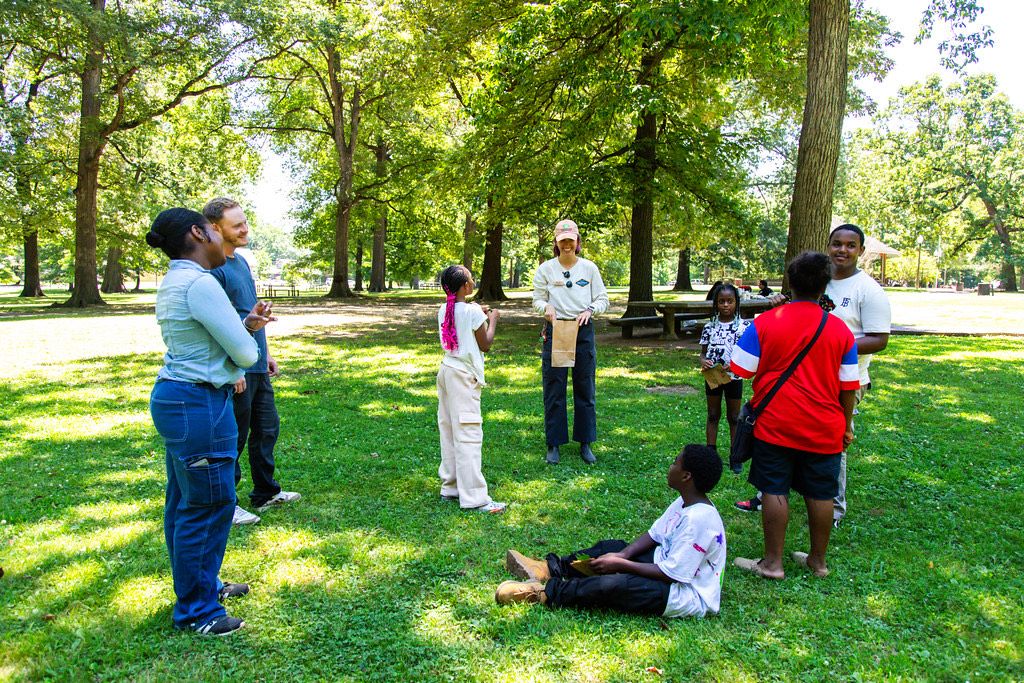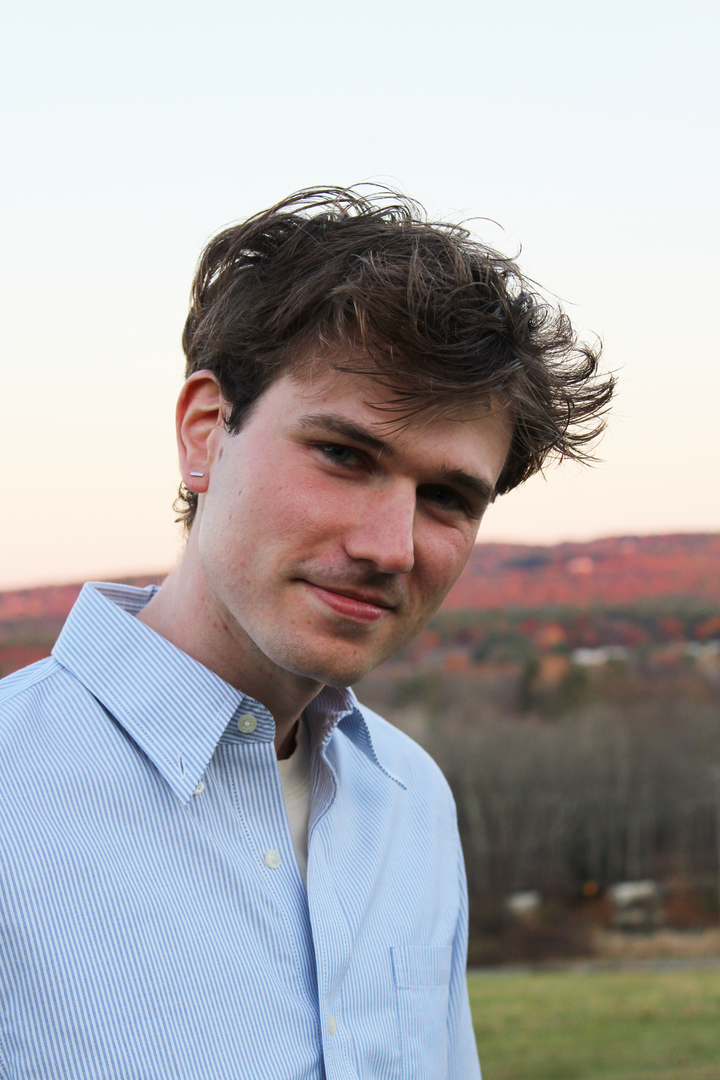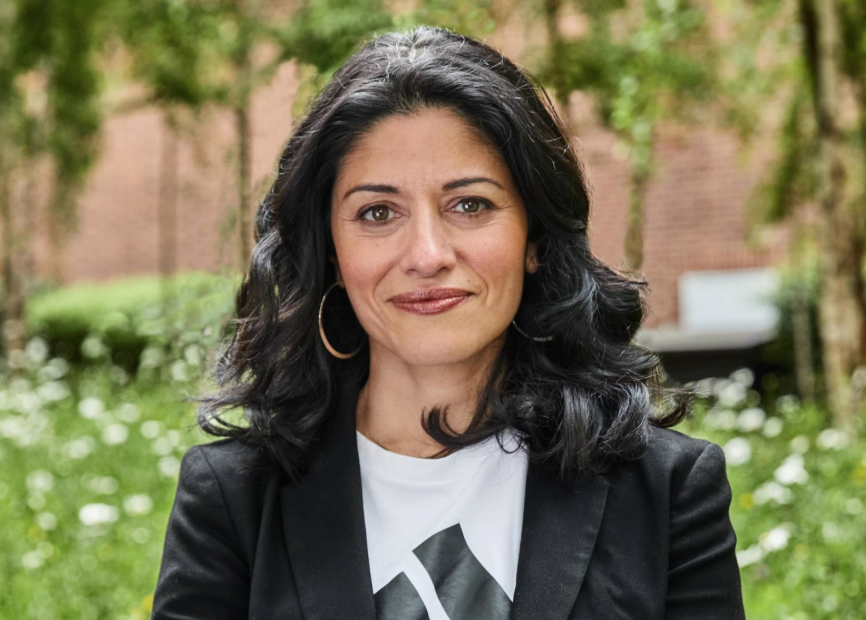Finding Where She’s Meant to Be — Alumni Profile, Heather Lynn Grotzinger ’20
From Colorado College to Memphis, Tennessee, Heather Grotzinger ’20 has been following an instinct to work with people — which is now leading her back to school.

In another profile published in this issue, Amanda Bradley ’90 offers a piece of wisdom for those of us yet to complete our time at Amherst. She says, essentially, that it’s okay to not know what you will do right after you graduate, that it’s appropriate to take your time, that you should never be afraid to change course. Finding a job is primarily about both enjoying the day-to-day process of working and finding some kind of real meaning in the work.
Heather Grotzinger ’20, the subject of this profile, has lived that advice. Since she graduated virtually during the pandemic, Grotzinger has helped teach geology students at Colorado College, spent two years with Teach for America in Memphis, been a park ranger for a conservancy, and, finally, applied to graduate school. She called me from New Zealand, where she’s traveling with her partner for the three months in between the end of her last job and the beginning of her graduate school program, in sustainability management, at American University. Grotzinger’s journey has been far from linear. But, as she says and as her story appears to prove, “you will find your way to the places you’re meant to be.”
Academic Wayfinding
Grotzinger was born in Pasadena, California. Her high school was small — Grotzinger thinks that probably a hundred students graduated with her — which led her to seek out a small college. “I really appreciated being able to have a relationship with my teachers in high school,” Grotzinger said. “If I was struggling academically, I felt like I was able to access resources more easily … And anything felt bigger after [high school].”
Grotzinger ended up at Amherst mostly because of the promise of the open curriculum — something she took full advantage of while she attended. “I really feel like being at Amherst nourishes all of your side interests,” she said. “I definitely feel like I got a good chunk of liberal arts education.”
Life before Amherst influenced Grotzinger’s academic decision-making in one other significant way. Grotzinger’s father is a geologist, so, as she says, she “grew up learning about rocks just from, like, him pulling the car over on the side of the road during road trips and talking about rocks.” Naturally, she took the geology department’s intro class (usually referred to as “111”) her first semester, and, like generations of unsuspecting underclassmen before and after her, she declared the major.
History was a bit more of a surprise for Grotzinger, who was never a fan of the subject in high school. However, the classes at Amherst were exciting, and the department’s strong interdisciplinary lens made the experience of the department very different from high school history classes, Grotzinger explained. “I realized that history is so much more than learning facts,” she said.
Throughout our conversation, the relative recency of Grotzinger’s graduation made me feel much closer to her academic experience. We both took 111 with Peter Crowley, a now-emeritus professor of geology, for example. Her thesis also rung a bell. Her project, in the subdiscipline of sedimentology, used mercury concentrations in 20 million-year-old sedimentary rocks to try to constrain the timing of an enormous volcanic event (and thereby help decide whether or not that volcanic activity caused subsequent global warming). With her advisor, Professor of Geology Dave Jones, Grotzinger completed fieldwork in northeastern Italy, where she also got to see the spot where the first evidence for a meteor being the cause of the dinosaurs’ extinction was collected. And in a class I took with Jones, just five years later, we stood at that very spot to collect material for a research project that used some of the methods Grotzinger would have employed in her thesis.
Away From Lab
As excited as Grotzinger was about her classwork, she did not spend all of her time at Amherst in the library or the lab. She swam all four years, and was co-captain of the swim team during her senior year. She credits all of her teammates, as well as recently-retired coach Nick Nichols, with strengthening her love for swimming. “It’s a tough sport,” Grotzinger said. “But he made it really fun.”
Besides swimming, Grotzinger spent much of her time on campus at Book & Plow farm. She was introduced to the farm on an orientation trip and immediately fell in love with the farm and its people. Swimming made it logistically difficult to work at the farm, but she was able to work as part of a transitional crew between the end of spring and the beginning of summer — a roughly two-week experience that she called a highlight of her time at Amherst.
The fulfillment Grotzinger found in these people-focused extracurriculars made her pause when considering graduate school right after college. During her thesis, which she loved the process of working on, she found herself asking, “Can I pursue a career in [this]?” Long hours in a lab would mean interacting with fewer people on a daily basis than other careers. Teaching, for example, would allow Grotzinger to continue doing the relationship-building work she found so fulfilling on the swim team and inspired by her professors at Amherst. Some soul searching finally made it clear that Grotzinger didn’t need to go back to school.
“I don’t need to do it because I feel like that’s what I should do,” she explained.
A Meander
Having decided to become a teacher after college, a new host of difficulties presented themselves. Many of the programs coming out of college that Grotzinger looked at were master’s programs or teaching assistantships through programs like AmeriCorps — which wouldn’t allow Grotzinger very much time to actually teach. Teach for America (TFA), a nonprofit organization that places recent college graduates in two-year teaching positions in low-income communities across the country, seemed to be one of the only ways for Grotzinger to ensure that she would teach after graduation.
TFA wasn’t without its problems, though — several people warned Grotzinger that the program isn’t always as helpful as possible for the communities it serves, since the young people it exports to underfunded schools often don’t understand the nuances of those communities, making it difficult to foster a positive teaching environment. With only about six weeks of training before entering the classroom, Grotzinger said, “You either make it or you don’t,” and many teachers end up quitting during or shortly after the training. But after many conversations with friends and previous TFA teachers, Grotzinger decided that the challenge of learning how to be an effective teacher in whatever community she was placed in was worthwhile, and she applied to the program.
But here, before she even walked the commencement stage, the momentum of her transition from Amherst student to alumna was arrested. Amherst sent all of its students away from campus as the pandemic intensified, leaving Grotzinger’s thesis (as well as many others) mid-analysis, preventing her from completing it before graduating, and making her question her immediate post-grad plans. As education systems around the country reeled from the impact of the pandemic, it felt less and less possible for Grotzinger to join TFA immediately. So she deferred admission to the program, adding a yearlong meander to her post-grad pathway.
In the intervening year, most of which saw schools across the country shifting teaching online, Grotzinger was able to serve as a geology teaching assistant at Colorado College, whose geology program is known for a focus on out-of-classroom experience and intensive fieldwork. Grotzinger’s role in the department was, essentially, to organize the many field trips the undergraduates went on throughout the year.
The field trips, of course, were different because of the pandemic. What were often multi-day experiences in previous years became single-day excursions, where students would (for example) be given e-bikes to ride around geological formations in Colorado Springs with Grotzinger and a professor. Here Grotzinger was able to use her passion for sedimentary geology from Amherst in a teaching setting.
“It was a really good experience for me,” she said, “because it helps solidify that I did like teaching and working with people.” Even though the pandemic and online classes presented plenty of obstacles that year, the experience of teaching made her only more certain that teaching, at that moment, was for her. “Maybe I won’t do it forever,” she remembers telling herself, “but it’s the right step for me right now.”
To Memphis
Grotzinger’s meander reached its end with a TFA placement on the banks of the Mississippi, in Memphis, Tennessee. There she taught kindergarten at a downtown public school for two years. “It was really hard at the beginning,” she remembered. “But I was specifically teaching reading comprehension for kindergarteners. So I didn’t have to do all the subjects — we divided [them] with other kindergarten teachers.” This focus on one subject allowed Grotzinger to “dive into” her topic, and spend time making sure that students of various educational backgrounds (some of whom may not have had pre-K or daycare) were served by her lessons.
Teaching reading comprehension felt natural to Grotzinger, and even as challenges mounted in her second year, when she switched to teaching math (and science, when it wasn’t canceled by the district) with a much larger group of students, she once again felt affirmed in her decision to pursue teaching at the moment. At that time in her life, it felt absolutely right.

Being a teacher in Memphis exposed Grotzinger to hundreds of lives that extended far beyond the classroom walls. In the communities she worked in, many students lived in food deserts, with unreliable or nonexistent access to transportation. Her latent interest in food systems work, which had been introduced to her at Book & Plow, was reawakened by her sense of helplessness as a teacher to do something about the infrastructural problems she saw. “I was exposed to a lot,” Grotzinger said. “And I don’t think I would have seen those [issues] so clearly if I hadn’t been in Memphis.” Her feeling of being quickly embedded into the city became a new source of motivation, and as her time as a teacher came to a close, new pathways forward began to appear.
Out of the helpless feeling she sometimes experienced as a teacher, Grotzinger says, “[I] realized that I think I do want to actually go back to school and specifically focus on things like improving food systems … or things like mobility, community planning, and urban planning.”
With a application deadlines on the horizon, Grotzinger got ready to begin applying to programs in sustainability management. The field appealed to Grotzinger because, like Amherst’s history department, they approached sustainability with an interdisciplinary lens — including coursework in public policy as well as environmental science. “From my experience teaching and working in Memphis,” Grotzinger explained, “I saw firsthand how important it is to understand all of those things.”
This firsthand experience came from her teaching, but, since she decided to apply to programs at the end of the school year, she found other work in Memphis while she polished her applications. Overton Park, a park “right in the heart of Midtown Memphis, [with] old forest trails and green spaces,” and which partnered with separate entities like a golf course, an art museum, an outdoor amphitheater, and a zoo, was often a refuge for Grotzinger after school. When she found out that they were hiring a park ranger after her term with TFA ended, she applied immediately.
The Overton Park Conservancy, the nonprofit organization that runs the park, made for an incredibly variable workplace. Grotzinger developed programming for outdoor education in the park, but also performed duties from reporting damage and assessing park facilities to leading local school field trips and using a chainsaw. Grotzinger, at this point, has not yet worked a desk job. “I like being on my feet. I like doing different things every day … I’m not sure if a desk job is for me.”
And Back to School
In Memphis, Grotzinger told me, the three largest parks are managed by nonprofits and conservancies that, while partially subsidized by the city, are responsible for raising funds and taking care of the land themselves. Overton therefore introduced Grotzinger to the complex dynamics of nonprofit management, something she hadn’t encountered at Amherst. This exposure to a new way of working in relation to food systems, community education, and city infrastructure is most directly responsible for her decision to apply to graduate programs with focuses in policy and nonprofit management. In fact, it is Grotzinger’s hope to go into nonprofit management after school, and she’s looking to work in the field while she attends her master’s program in Washington, D.C.
Something else exciting about her program, at American University, is that it begins in the spring — giving Grotzinger a few months of free time after her Overton job and before diving back into academic life. That time is what brought her to New Zealand, which is as good a place as any I can think of to reflect on a meandering but fruitful path through the post-college experience. Grotzinger has spent real time working with people to figure out what she might really want to do. Of course, her future is as yet invisible. But, after years of learning who she is, Grotzinger is ready to go back to school and open up a new realm of opportunities. “I don’t have a dream job itself,” she said. “I think I’m open to a lot of things.” Naming ideas from working for another park conservancy, to working directly in food systems, to doing something related to scientific communication to the public, to increasing access to green spaces, Grotzinger finally landed on what sounds like a unifying motivation: “just helping people.”
In Closing: Get Out!
Above all, Grotzinger emphasized that her post-college journey is exactly what allowed her to settle on a truly satisfying-feeling career path. Amherst, while it exposed Grotzinger to all kinds of subjects, ideas, and classes, left her feeling stuck, with no obvious career path right out of graduation. Grotzinger, remembering how she felt as a senior, said “I don’t even know if I fit into any of these [career paths], or if I fit somewhere in between them.” No career advisor could tell her what she wanted or needed to do. Instead, she followed an instinctive pull to her core values, like her desire to work with people. “And I feel like when I do go back to school,” she said, “my professional experience will serve me well because I didn’t rush into it.”
Finally, Grotzinger added, “One other thing! I felt like I had to, like, stay on the East Coast upon graduating. Even when I left, I felt like I was doing something very rogue. Don’t be afraid to do that.” Move out of New England. Go a little rogue. For Grotzinger, it has been a fulfilling journey.





Comments ()